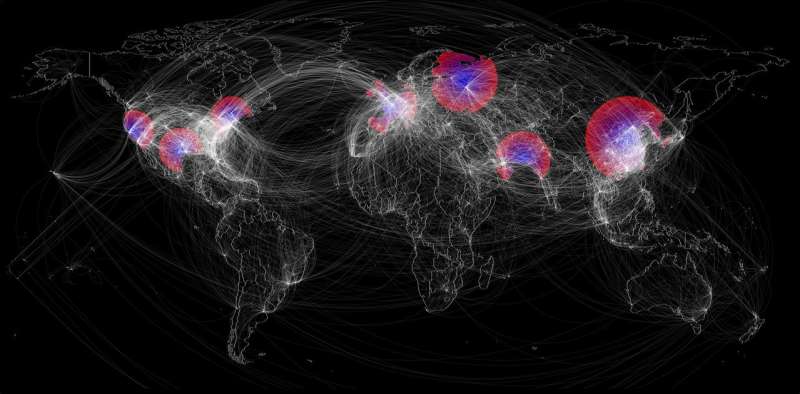Flu simulations suggest pandemics more likely in spring, early summer

New statistical simulations suggest that Northern Hemisphere flu pandemics are most likely to emerge in late spring or early summer at the tail end of the normal flu season, according to a new study published in PLOS Computational Biology by Spencer Fox of The University of Texas at Austin and his colleagues, Lauren Ancel Meyers (also at UT Austin) and Joel C. Miller at the Institute for Disease Modeling in Bellevue, WA.
Genetic mutations and mixing between different influenza viruses create new viral strains every year, occasionally leading to new pandemics. One might expect that the risk of a new pandemic is highest at the height of the flu season in winter, when viruses are most abundant and most likely to spread. Instead, all six flu pandemics that have occurred since 1889 emerged in spring and summer months.
Fox and his colleagues hypothesized that the late timing of flu pandemics might be caused by two opposing factors: Flu spreads best under winter environmental and social conditions. However, infection by one flu virus can provide temporary immune protection against other flu viruses, so pandemic strains cannot spread well while this temporary immunity is widespread. Together, this leaves a narrow window in the late spring and early summer for new pandemics to emerge.
To test this hypothesis, the researchers developed a computational model that mimics viral spread during flu season, with the built-in assumption that people infected with seasonal flu gain long-term immunity to seasonal flu and short-term immunity to emerging pandemic viruses. The model incorporates real-world data on flu transmission from the 2008-2009 flu season and correctly predicted the timing of the 2009 H1N1 pandemic.
The scientists used their model to run thousands of simulations in which new pandemic viruses emerged at different points throughout the flu season. They found that the combination of winter conditions and cross-virus immunity indeed led to spring and summer pandemics, supporting their hypothesis.
"We don't know when or where the next deadly flu pandemic will arise," says Lauren Ancel Meyers, principal investigator of the study. "However, the typical flu season leaves a wake of immunity that prevents new viruses from spreading. Our study shows that this creates a narrow, predictable window for pandemic emergence in the spring and early summer, which can help public health agencies to detect and respond to new viral threats."
Future research may focus on more precisely characterizing the cross-strain immunity that impedes pandemic emergence during the normal flu season. Scientists may also explore how these pandemic risk patterns manifest in the Southern Hemisphere and tropical regions.
More information: Fox SJ, Miller JC, Meyers LA (2017) Seasonality in risk of pandemic influenza emergence. PLoS Comput Biol 13(10): e1005749. doi.org/10.1371/journal.pcbi.1005749


















